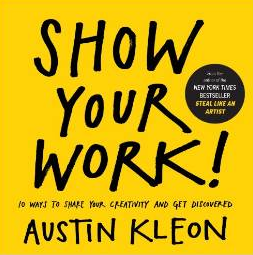I recently read “Show Your Work! 10 Ways To Share Your Creativity And Get Discovered” by Austin Kleon. Below are the quotes I found most interesting. If you like the quotes, please buy the full book here.
 “The best way to get started on the path to sharing your work is to think about what you want to learn, and make a commitment to learning it in front of others.” (19)
“The best way to get started on the path to sharing your work is to think about what you want to learn, and make a commitment to learning it in front of others.” (19)
“Artists love to trot out the tired line, “My work speaks for itself,” but the truth is, our work doesn’t speak for itself. Human beings want to know where things came from, how they were made, and who made them. The stories you tell about the work you do have a huge effect on how people feel and what they understand about your work, and how people feel and what they understand about your work effects how they value it.” (93)
“Author John Gardner said the basic plot of nearly all stories is this: “A character wants something, goes after it despite opposition (perhaps including his own doubts), and so arrives at a win, lose, or draw.” I like Gardner’s plot formula because it’s also the shape of most creative work: You get a great idea, you go through the hard work of executing the idea, and then you release the idea out into the world, coming to a win, lose, or draw. Sometimes the idea succeeds, sometimes it fails, and more often than not, it does nothing at all.” (99)
“Every client presentation, every personal essay, every cover letter, every fund-raising request – they’re all pitches. They’re stories with the endings chopped off. A good pitch is set up in three acts: The first act is the past, the second act is the present, and the third is the future. The first act is where you’ve been – what you want, how you came to want it, and what you’ve done so far to get it. The second act is where you are now in your work and how you’ve worked hard and used up most of your resources. The third act is where you’re going, and how exactly the person you’re pitching can help you get there. Like a Choose Your Own Adventure book, this story shape effectively turns your listener into the hero who gets to decide how it ends.” (101)
“George Orwell wrote: “Autobiography is only to be trusted when it reveals something disgraceful.”” (108)
“In their book, Rework, Jason Fried and David Heinemeier Hansson encourage businesses to emulate chefs by outteaching their competition. “What do you do? What are your ‘recipes’? What’s your ‘cookbook’? What can you tell the world about how you operate that’s informative, educational, and promotional?” They encourage businesses to figure out the equivalent of their own cooking show.” (117)
“Teaching people doesn’t subtract value from what you do, it actually adds to it. When you teach someone how to do your work, you are, in effect, generating more interest in your work.” (119)
“This story shows what happens when a musician interacts with his fans on the level of a fan himself.” (127)
“Steve Albini says, “being good at things is the only thing that earns you clout or connections.” (131)
“Once a good knuckleball is thrown, it’s equally unpredictable to the batter, the catcher, and the pitcher who threw it. (Sounds a lot like the creative process, huh?) (139)
“Colin Marshall says: “If you spend your life avoiding vulnerability, you and your work will never truly connect with other people.”” (152)
“You have to remember that your work is something you do, not who you are. This is especially hard for artists to accept, as so much of what they do is personal.” (152)
“Comments outnumber ideas.” (156)
“Cartoonist Natalie Dee says: “There’s never a space under paintings in a gallery where someone writes their opinion.” (157)
“Artist Ben Shan says: “An amateur is an artist who supports himself with outside jobs which enable him to paint. A professional is someone whose wife works to enable him to paint.” (161)
“Walt Disney: “We don’t make movies to make money, we make money to make more movies.”” (172)
“Try new things. If an opportunity comes along that will allow you to do more of the kind of work you want to do, say Yes. If an opportunity comes along that would mean more money, but less of the kind of work you want o do, say No.” (174)
“The people who get what they’re after are very often the ones who just stick around long enough.” (183)
“Isak Dinesen wrote, “You can’t count on success; you can only leave open the possibility for it, and be ready to jump on and take the ride when it comes for you.”” (185)
“A successful or failed project is no guarantee of another success or failure. Whether you’ve just won big or lost big, you still have to face the question “What’s next?”” (187)
“You can’t be content with mastery; you have to push yourself to become a student again.” (197)
“Alain de Botton wrote, “Anyone who isn’t embarrassed of who they were last year probably isn’t learning enough.”” (197)
“First, be useful. Then necessary.” (206)
Liked the quotes? Click here to buy the book.

